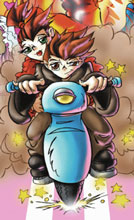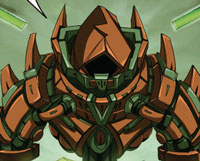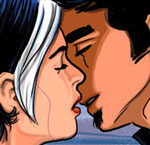
This week, Tim presents two interviews from his time in Portland, Oregon!

First, Lacy Davis and Jim Kettner talk about their first graphic novel, Ink in Water: An Illustrated Memoir (Or, How I Kicked Anorexia’s Ass and Embraced Body Positivity), about Lacy’s battles with anorexia. They talk about the process of making the book, the challenges of collaborating with your spouse, and the nature of eating disorders, which have both physical and mental effects.

Then, a front-porch chat with Charles Brownstein, Executive Director of the Comic Book Legal Defense Fund. What is the organization’s mission and how did it come to be based in Portland? What have been its biggest victories and defeats? What’s the difference between censorship by the government or by private companies? The difference between comics that show drawings of kids in sexual situations, versus actual child pornography? Also, the rise and fall of the Comics Code. Were comics EVER really “just for kids”?
Podcast: Play in new window | Download

 Benji Ratliffe sent us his four-year-old unpublished work Fashionable Nonsense for critique. It’s a somewhat supernatural tale with a Scott Pilgrim tone. He wrote the script and hired an artist. While it does indeed have some problems — with clarity of the story, as well as storytelling and inking — why not put it out anyway? Tim and Mulele extol the virtues of putting your work out, even if you’re not 100% satisfied with it.
Benji Ratliffe sent us his four-year-old unpublished work Fashionable Nonsense for critique. It’s a somewhat supernatural tale with a Scott Pilgrim tone. He wrote the script and hired an artist. While it does indeed have some problems — with clarity of the story, as well as storytelling and inking — why not put it out anyway? Tim and Mulele extol the virtues of putting your work out, even if you’re not 100% satisfied with it.
 The Martian Confederacy returns! As volume 2 moves toward its release, artist Paige Braddock and writer Jason McNamara return to the podcast to discuss Mars in the year 3535, as well as the good and bad points of their collaboration.
The Martian Confederacy returns! As volume 2 moves toward its release, artist Paige Braddock and writer Jason McNamara return to the podcast to discuss Mars in the year 3535, as well as the good and bad points of their collaboration. A recent Comics Reporter
A recent Comics Reporter  Skim is a coming-of-age graphic novel written by Mariko Tamaki, and drawn by her cousin
Skim is a coming-of-age graphic novel written by Mariko Tamaki, and drawn by her cousin  What are the good and bad points of collaborating with someone on a comic? What adjustments do writer and artist need to make to each other’s way of working? As a case study in collaboration, Mulele and Kumar discuss the ups and downs of their collaborations on the comics “Full Throttle” and “
What are the good and bad points of collaborating with someone on a comic? What adjustments do writer and artist need to make to each other’s way of working? As a case study in collaboration, Mulele and Kumar discuss the ups and downs of their collaborations on the comics “Full Throttle” and “